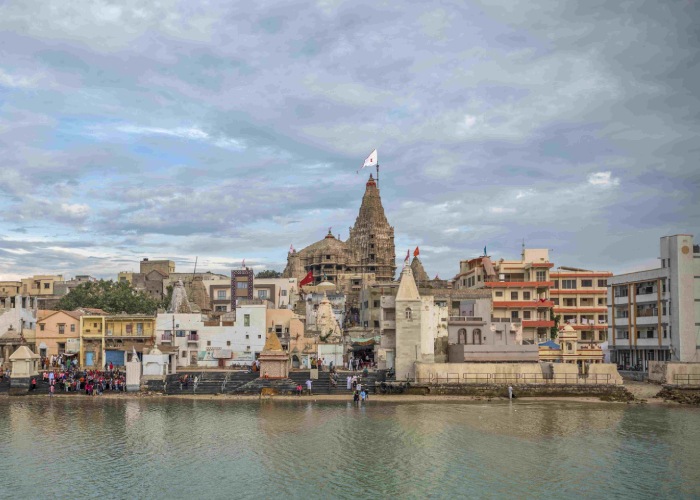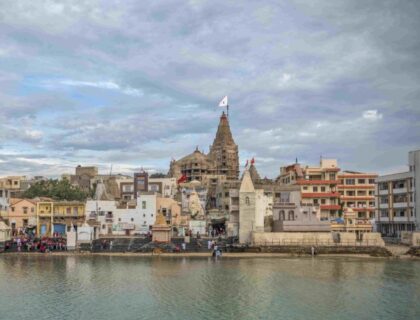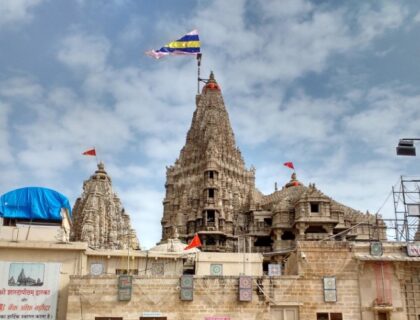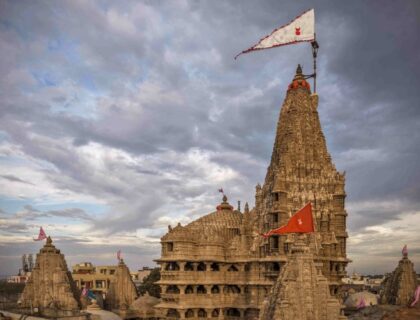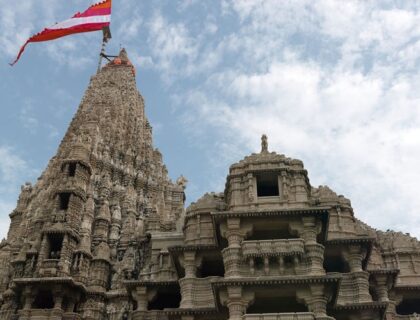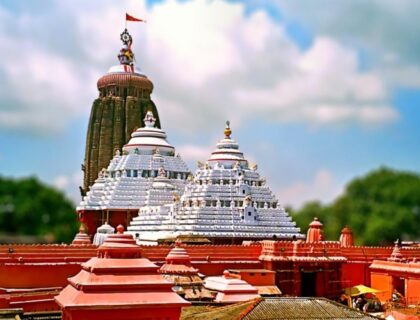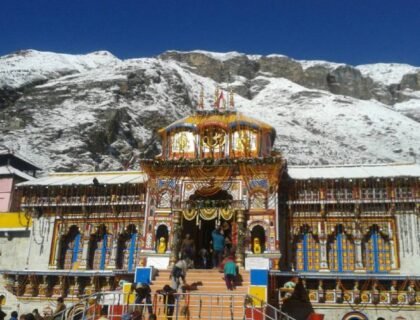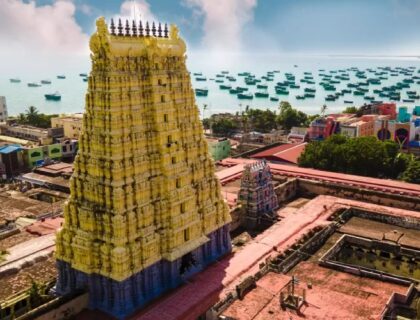Dwarkadhish Temple Dwarka
Dwarkadhish Temple Dwarka, also known as the Jagat Mandir Dwarakadheesh is a Hindu temple that is devoted to Lord Krishna located in Dwarka City Of Gujrat. The Dwarkadhish Temple (Jagat Mandir) is believed to have been built more than 5,000 years ago by Lord Krishna’s great-grandson, Vajranabh. It is a destination along the Hindu pilgrimage circuit known as the Char Dham.
The ancient temple has been renovated several times, most notably in the 16th and 19th centuries. The temple is built on a small hill accessed by more than 50 steps, with heavily sculpted walls that surround the sanctum, which houses the main Krishna idol.
Story Behind Dwarkadhish Temple Dwarka
According to Hindu legend, Dwarka was founded on a land parcel recovered from the ocean by Lord Krishna. Krishna and his wife Rukmini were once visited by Sage Durvasa. The wise man Durvasa wished they’d come with him to their palace to lord Krishna. The couple readily agreed and began following the sage to their palace. Rukmini was thirsty after a long journey, so she asked Krishna for some water. Krishna dug a hole to bring the Ganga River. Sage Durvasa, enraged, cursed Rukmini to remain there. Rukmini is said to have stood in the temple that houses her shrine.

History of Dwarkadhish Temple Dwarka
The Dwaraka Kingdom is mentioned in the Mahabharata epic in reference to the centuries-old Gujarati town of Dwarka. The town is located on the Gomti River and is said to have been Krishna’s capital. An examination of anchors discovered on the site, as well as evidence such as a stone block with the script, the way the stones were dressed, and evidence of the use of dowels, indicate that the harbour site dates only to historical times, with some of the underwater structure dating from the late Middle Ages. The ancient port’s demise was most likely caused by coastal erosion.
Hindus believe that Vajranabh, the great-grandson of Krishna, built the original temple on top of Krishna’s residence palace. In 1472, Invader Mahmud Begada destroyed the temple, After which it was reconstructed by Hindu Rulers.
The current Chaulukya-style sanctuary was built between the 15th and 16th centuries. The sanctuary is 27 metres by 21 metres in size, with an east-west length of 29 metres and a north-south width of 23 metres. The temple’s highest point stands at 51.8 metres.
The architecture of Dwarkadhish Temple Dwarka
It is a five-story structure supported by 72 pillars (a sandstone temple with 60 pillars is also mentioned). There are two important entrances to the temple: the Moksha Dwar, which literally translates to “Door to Salvation,” and the Swarga Dwar, which literally translates to “Exit Door.” Gate to Heaven”).

Dwarkadeesh, also known as the Trivikrama form of Vishnu and depicted with four arms, is the primary deity deified in the sanctum. Balarama, Krishna’s older brother, is deified in the chamber to the left of the main altar. The images of Pradyumna and Aniruddha, Krishna’s son and grandson, are housed in the chamber to the right. Goddesses Radha, Jambavati, Satyabhama, and Lakshmi are represented by idols in several shrines that surround the central shrine.
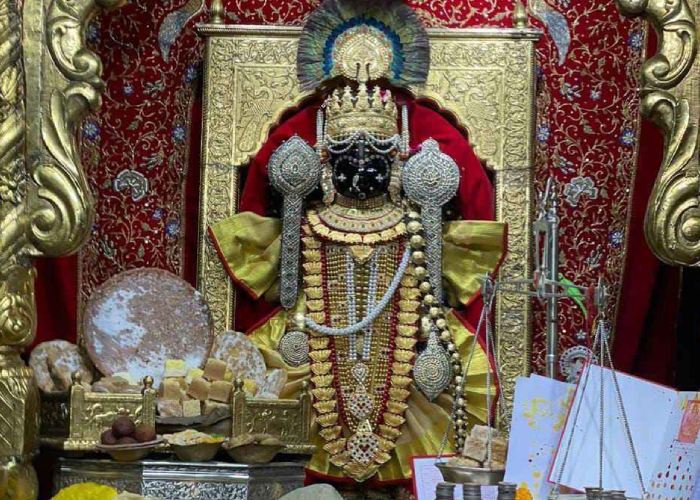
Carvings that encircle The temple spire rises to a height of 78 metres (256 feet), and a large flag with Sun and Moon symbols is flown from it. The triangular flag is 50 feet (15 metres) long. It also has shrines dedicated to Madhav Raoji, another name for Krishna, Balrama, and the sage Durvasa. There are also two separate shrines dedicated to Radha Krishna, and Hindus pay a significant sum of money to hoist this flag by purchasing a new one every four days. The temple’s trust fund receives funds from this account to cover operating and maintenance costs.
Facts about Dwarkadhish Temple Dwarka
- Many people are unaware that Lord Krishna moved to Dwarka from Mathura, where he was born.
- Dwarka, located on the banks of the Gomti River, is also known as Dwarkadish, which means “King of Dwarka.”
- it is expected that 5000 years back, this palace was built by Lord Krishna’s grandson, Vajranabha.
- Legend says that Lord Krishna built the first city, which ended up submerged in the sea. A few years ago, an underwater excavation proved that there were architectural remains beneath the water.
- Do you know that the Lord Krishna idol in the Dwarkadish temple is black? It was built a long time ago during the 15th century using limestone in the Chalkya style.
Famous Festivals In Dwarkadhish Temple Dwarka
Krishna Janmashtami – Lord Krishna was born on Ashtami, the eighth day of the Hindu month of Bhadra. The celebrations at the Dwarkadhish Temple begin early in the morning and continue until late at night.
Holi – This festival is celebrated in the month of Phalgun (Feb – March). During the celebration, people celebrate with colours and also celebrate and enjoy in temples complex.
How To reach Dwarkadhish Temple Dwarka
The best time to visit Dwarkadhish Temple Dwarka is between November and February, and during Janmashtami which is celebrated grandly here.
By Air: Porbandar (95 km) and Jamnagar (145 km) are the closest airports to Dwarka.
By Rail: The nearest railway station to Dwarkadhish Temple Dwarka is the Dwarka Railway Station. The distance from Dwarka railway station to Dwarkadhish Temple is just 1 km.
By Road: The city is well connected by robust state-run buses and taxis. You can reach Dwarkadhish Temple Dwarka by local bus/taxi after reaching Dwarka city.
Also Read – Jagannath Temple Puri
Support Us
If our content helps you even 1% in gaining information about the temple, please support us by contributing any amount, our UPI ID is - q417999792@ybl Or pay using QR CODE >>> Click Now
Location
Facilities
- Drinking Water
- Pooja Item Shops
- Prasad Shops
- Restaurants Nearby
- Resting Room

